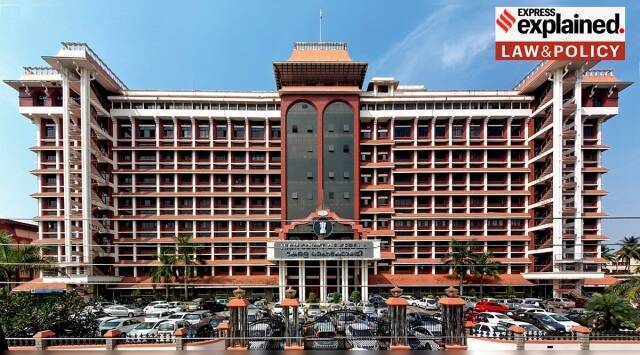‘Bank can’t refuse education loan over student’s CIBIL score’: What the Kerala HC held
In its ruling, the court also relied on two Kerala High Court rulings from the year 2020 on education loans. Here's what they said.
 The Kerala High Court was dealing with a petition filed by a student seeking sanction and disbursal of an education loan worth Rs 4,07,200. (File)
The Kerala High Court was dealing with a petition filed by a student seeking sanction and disbursal of an education loan worth Rs 4,07,200. (File) The Kerala High Court Wednesday (June 7) stayed an order passed by single-judge PV Kunhikrishnan which said that a student’s credit score cannot be a factor in rejecting an education loan application.
Acting on an appeal filed by the State Bank of India (SBI), a Bench of Acting Chief Justice SVN Bhatti and Justice Basant Balaji temporarily stayed an order dated May 30, directing the banks to sanction educational loans to students without rejecting them on the basis of a low CIBIL or credit score.
The bank had challenged the order on grounds that the credit sanctioning has to be carried out according to the applicable rules and guidelines such as the Credit Information Companies Act, 2005, which deals with the regulation of credit information companies and facilitates efficient credit distribution.
On May 30, the High Court had held that a student’s credit score cannot be a factor in rejecting an education loan application.
Calling students the “nation builders of tomorrow”, a Bench of Justice PV Kunhikrishnan added that the student’s education loan application should not have been rejected simply because he had a low CIBIL or credit score. Read in Tamil
A Credit Information Bureau (India) Limited (CIBIL) score is a three-digit numerical summary of one’s credit history, which involves an individual’s credit payment history across loan types and credit institutions over a period of time.
What was this case?
In Noel Paul Fredy vs State Bank of India, the Kerala High Court was dealing with a petition filed by a student seeking sanction and consequently the disbursal of an education loan worth Rs 4,07,200 within the stipulated time.
On finding that the balance of convenience was in favour of the student, who completed his course on May 31 and had also secured a job in Oman, the court directed the bank to sanction and disburse the loan to the petitioner student’s college.
“While considering Education Loan application, a humanitarian approach is necessary from the Banks. Students are the nation builders of tomorrow. They have to lead this country in future. Simply because, there is low CIBIL score to a student, who is an applicant for Education loan, I am of the considered opinion that Education loan application ought not have been rejected by Bank,” the court said.
Observing that in this case, the student had secured a job offer too, the court stated, “Banks may be hypertechnical, but a court of law cannot ignore the ground realities.”
In its ruling, the court also relied on two Kerala High Court rulings from the year 2020, including KM George vs The Branch Manager and Pranav SR vs The Branch Manager.
What was the order passed by the single judge?
In KM George vs The Branch Manager, the court said that the rejection of the student’s loan application for a deficiency in his father’s credit score was arbitrary and violative of the spirit of the circular issued by the Reserve Bank of India on April 28, 2001.
In this case, while the student was given a scholarship by his university for the fee of the first two semesters on account of his merit, the court found that the bank had failed to assess the student’s repaying possibilities based on his course’s potential and his future earning capabilities, consequently depriving him of an opportunity to pursue his studies.
Analysing the provisions “contained in the circular issued by the Reserve Bank of India” to the scheduled commercial banks in furtherance of a policy decision of the government to ensure that no student is denied the opportunity to pursue higher education for want of financial support and also the Model Educational Loan Scheme prepared by the Indian Banks Association, the court found that the “object of educational loan scheme is to ensure that a meritorious student shall not be deprived of the opportunity to pursue higher education merely on the ground that he/she does not have resources for the same and that the correctness of the stand of the Bank has to be examined in that background.”
Similarly, in Pranav SR vs The Branch Manager, where the petitioner belonged to the OBC community and was seeking an educational loan for continuing his B.Tech studies, the court said that “unsatisfactory credit scores of the parents of the petitioner cannot be a ground to reject an educational loan in view of the fact that the repayment capacity of the petitioner after his education should be the deciding factor.”
What did the RBI circular say?
On April 28, 2001, the RBI issued a circular in which it mentioned a comprehensive “model educational loan scheme” prepared by the Indian Banks Association (IBA) “for adoption by all banks”.
The scheme aimed to provide financial support from the banking system to deserving or meritorious students pursuing higher education in India and abroad. Additionally, it was announced in the Union Budget for 2001–2002. While this scheme provided broad guidelines for banks to operationalise education loans, its implementation by banks varied.
Following this, on June 24, 2019, the RBI advised all scheduled commercial banks to adopt the educational loan scheme formulated by IBA in 2001.





- 01
- 02
- 03
- 04
- 05


































